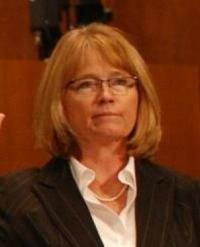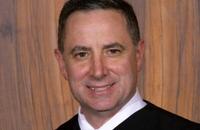
Illinois Central District Court Judge Sue Myerscough
SPRINGFIELD - A federal judge in Springfield won’t let a hospital system discharge a class action complaint accusing it of utilizing pre-employment screening questions in violation of a genetic information privacy law.
Mary Million filed her lawsuit against Hospital Sisters Health System and St. Francis Hospital in December, alleging questions about her family medical history were improper under the Genetic Information Privacy Act. HSHS, which operates 15 Midwestern hospitals and other health care facilities, asked U.S. District Judge Susie Myerscough to dismiss the complaint.
According to Million, as part of applying for a job at St. Francis Hospital in Litchfield she submitted to an in-person medical exam in June 2022 at Priority Care in Springfield, also an HSHS facility. Part of that screening included questions about “a history of heart disease, asthma or psychological conditions in” Million’s family, Myerscough wrote, which Million alleged violate GIPA provisions that say employers cannot, directly or otherwise, “solicit, request, require or purchase genetic testing or genetic information of a person or a family member of the person, or administer a genetic test or a person or a family member of the person as a condition of employment, preemployment application, labor organization membership or licensure.”
In arguing for dismissal, HSHS said its questions were generic and not attempts to discern “genetic information,” while also contending Million didn’t adequately allege intentional or reckless GIPA violations. But Myerscough said most of the cases HSHS cited are outside the U.S. Seventh Circuit - which includes the federal courts of Illinois, Wisconsin and Indiana - and said “other courts in Florida, Connecticut, Texas and Louisiana have found that some family history questions do not fall within their relevant statute, but these cases do not analyze GIPA,” and are therefore unpersuasive.
Million alleged HSHS never informed her that family medical questions constituted genetic information, nor did it tell her she could refuse to answer. Myerscough said the “questions involve a clear report of the manifestation of a disease or disorder in a family member, which is clearly specified in GIPA through its adaptation” of definitions in the Health Insurance Portability and Accountability Act.
“GIPA’s text and the adaptation of the definition of genetic information plainly include the ‘manifestation of a disease or disorder’ of family members as information an employer may not solicit or inquire about,” Myerscough wrote. “Further, (the Genetic Information Nondiscrimination Act), a federal statute also incorporated into GIPA, defines the term ‘family medical history’ as ‘information about the manifestation of disease or disorder’ in family members.”
Myerscough further said multiple courts in the federal circuit have denied dismissal motions based on preemployment screening questions and found Million’s complaint to meet the same standard. She also said Million adequately pleaded intentional or reckless conduct. HSHS cited actions brought under the similar Illinois Biometric Information Privacy Act where plaintiffs failed to have sufficient details to support such allegations, but Myerscough said Million had, at this early stage of the proceedings, meet the burden to survive dismissal.
In addition to the allegations of what transpired, Myerscough noted, Million alleged that, as sophisticated corporate entities, HSHS and St. Francis knew or should’ve known the questions violated GIPA but asked them anyway.
“These allegations are enough to survive the motion to dismiss stage as they indicate the specific state of mind held by defendants and facts plausible to support such contentions,” Myerscough wrote.
Million is represented by attorneys Gary M. Klinger and S. Jarret Raab, of the firm o Milberg Coleman Bryson Phillips Grossman, of Chicago; and Zachary Arbitman and
George Donnelly, of Feldman Shepherd Wohlgelernter Tanner Weinstock & Dodig, of Philadelphia.
HSHS is represented by attorneys Mary A. Smigielski, Mark W. Guest and Cameron T. Liljestrand, of Lewis Brisbois Bisgaard & Smith, of Chicago.




